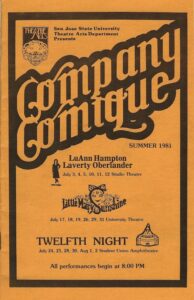 This summer marks the forty-year anniversary of my Master’s thesis production of LuAnn Hampton Laverty Oberlander by Preston Jones at San Jose State University. I had to do the math several times and yep, it’s been forty years. Then I had a conversation with myself to see if I was brave enough to admit that publicly. One the benefits of age is that after a while, you don’t give a hoot, so, yes, I’m old . . . and with age comes hindsight full of insights. One of those insights is that everything I learned in theater made me highly successful in the corporate world.
This summer marks the forty-year anniversary of my Master’s thesis production of LuAnn Hampton Laverty Oberlander by Preston Jones at San Jose State University. I had to do the math several times and yep, it’s been forty years. Then I had a conversation with myself to see if I was brave enough to admit that publicly. One the benefits of age is that after a while, you don’t give a hoot, so, yes, I’m old . . . and with age comes hindsight full of insights. One of those insights is that everything I learned in theater made me highly successful in the corporate world.
Lesson 1: Take risks and trust your instincts.
As you might have surmised with a show called LuAnn Hampton Laverty Oberlander, the actress who plays LuAnn is key to its success. On the last day of auditions, a relatively unknown actress showed up in flip flops and shorts. Within ten minutes, every instinct I had told me she was my LuAnn. Casting her was a highly controversial move. My thesis advisor kept reminding me my degree was on the line. No one really knew this woman! Yet, I felt it was worth the risk.
It worked out well. The show was a success – so successful we were asked to reprise it as the opening show in the fall. And I got the degree.
I carried that lesson into my career as a manger, trusting my hiring instincts and always being on the lookout for chemistry and collaboration.
Lesson 2: Secrets make for good drama but not career strategy.
Many dramatic stories involve characters with a secret who struggle to keep it hidden. It makes for good theater but isn’t the best career strategy.
Early in my corporate career, I got hired as a financial analyst at Oracle. During lunch one day, I mentioned my two degrees in directing theater to my manager. “Wait, what?” she said, with a look of concern. “I thought your degrees were in finance.” I realized my resume simply stated the university and the degree, not the subject. She had assumed those things from my work experience. “No, I really do have two degrees in directing theater.” That was supposed to make her feel better. Instead, her concern ratcheted up a notch as she whispered, “Don’t tell anyone. I mean, really, don’t tell anyone.” She looked around like we were in a spy movie. “We are only supposed to hire from specific schools and certain degrees. It would be really bad if they found out about this.”
I wasn’t sure who “they” were, but the perceived threat to her career, and mine, seemed very real. My theater background became a well-hidden secret for many years.
Yet, I just couldn’t help myself. I spent the next decade or so raising my hand to take on “theater-like” projects that involved event production, executive keynotes, and building communications teams. Finally, I had an executive pull me aside to ask if the rumor that my background was in theater was true. I confessed, unsure where he was going with this line of questioning. He counseled me to stop hiding it, saying “Now I understand you. Your creativity, collaboration and drive for results, all make sense. Own it!”
The secret was out! I finally owned my story without apology and embraced the uniqueness I brought to my work.
Lesson 3: Nurture a “What if?” environment.
There’s a feeling when I walk into a theater that’s hard to describe. My shoulders relax and my breath deepens with the smell of . . . I’m not sure what exactly . . . the smell of possibility, I think. The tingly anticipation of asking, what magic will happen today? That’s what theater does for me. My need for that, my ability to create that, could not stay hidden.
So, when a tech company I worked for did a last-minute product acquisition that needed to be highlighted at our annual customer event, I went to our production partners for ideas. We came up with a kabuki drop (look it up, it’s dramatic and risky). When I pitched it to the CEO, he said, “I don’t know what that is but I trust you . . . Of course, if it doesn’t work, you’re fired!”
It was a hit. I wasn’t fired. It even got mentioned in the press. But my favorite part of the event was that no one could remember whose idea it was – just a collection of ideas building on ideas within a creative environment that allowed us to ask “What if?” That’s what theater is all about and it can absolutely translate to the corporate world.
Lesson 4: Pay attention to detail. Be disciplined. Remain calm.
Unlike much of the corporate world, theater doesn’t allow for slipping dates or pushing deadlines. When the curtain goes up, you need to be rock solid and ready to perform. Having the discipline to deliver high-quality results in high-pressure situations with calm and confidence was a key to survival in the corporate world. I viewed everything through the lens of the “curtain going up” and it served me well throughout my career.
There were many more lessons, too many to list here. What I came to embrace is that my unique perspective stemming from years of training in the theater created unique opportunities in the corporate world.




